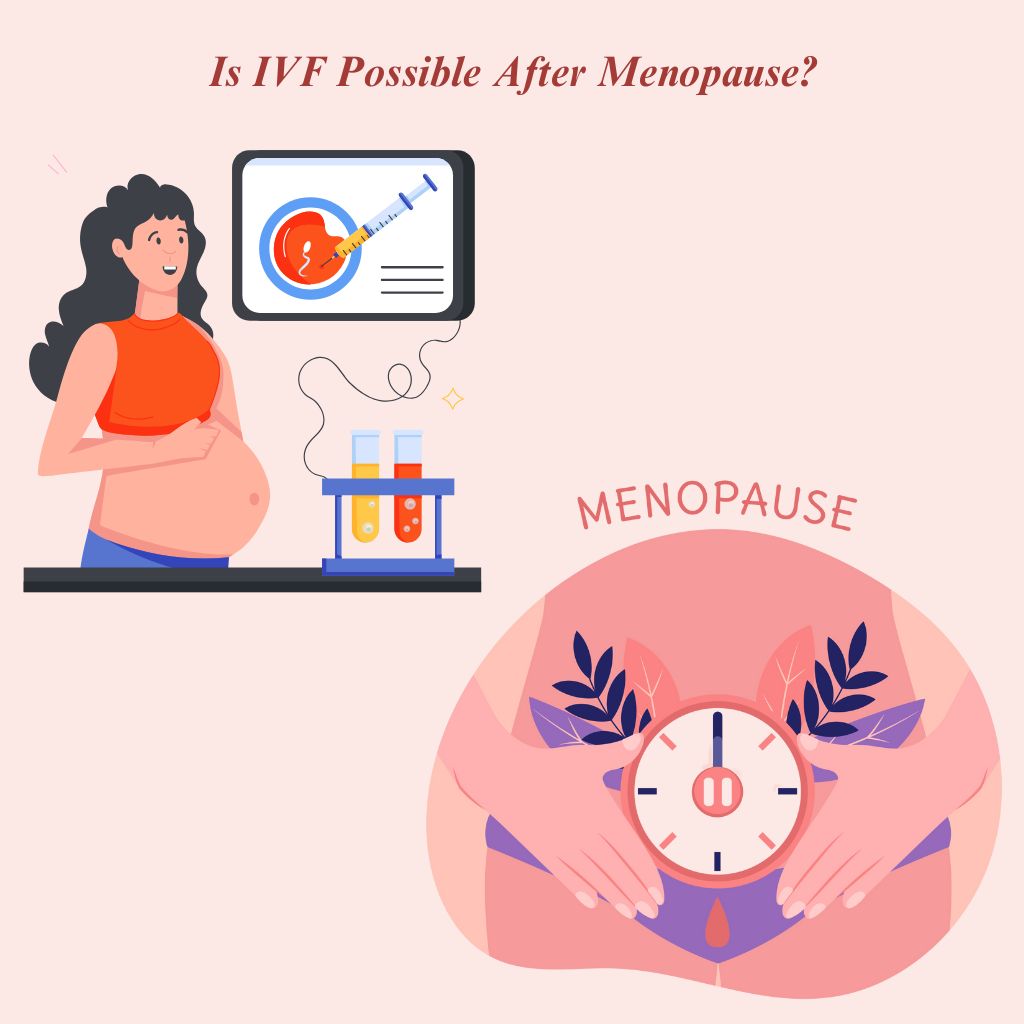Menopause is a natural phase in a woman’s life when her reproductive cycle comes to an end. It typically occurs between the ages of 45 and 55, marked by a gradual decline in hormone levels. As a result, the ovaries stop releasing eggs, and natural conception becomes nearly impossible.
This change leads many to believe that pregnancy is no longer an option after menopause. While it is true that natural conception is unlikely, advancements in medical science have made assisted reproductive techniques an option for women who wish to conceive later in life. One of the most effective methods for this is In Vitro Fertilization (IVF).
So, is IVF possible after menopause? The answer is yes, but it requires medical intervention. With the help of hormonal treatments and donor eggs, women who have gone through menopause can still carry a pregnancy. This process is commonly referred to as IVF after menopause and has helped many women fulfill their dream of becoming mothers.
Some may wonder, can IVF be done after menopause? The process differs from standard IVF procedures since a woman’s natural egg supply is no longer available. Instead, doctors use donor eggs or previously frozen embryos, which are fertilized and implanted into the uterus. This approach has made pregnancy after menopause possible for many women.
Medical advancements continue to push the boundaries of reproductive health, giving hope to those who may have thought it was too late to conceive.
Understanding Menopause and Fertility Decline
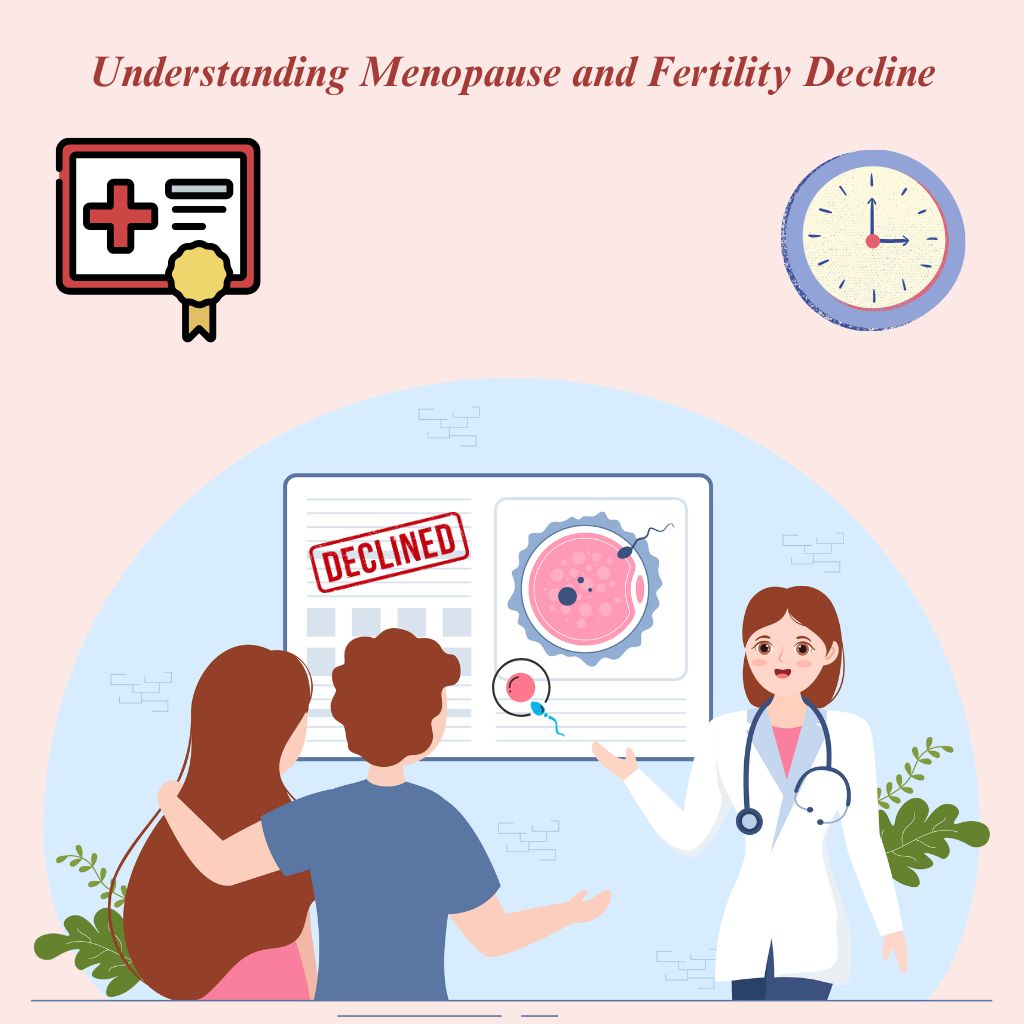
How Menopause Affects Natural Conception
As women age, their fertility naturally declines due to a reduction in ovarian reserve. This refers to the number and quality of eggs available for fertilization. Menopause is the final stage of this decline, occurring when the ovaries stop releasing eggs and hormone levels shift.
During the reproductive years, hormones such as estrogen and progesterone regulate ovulation and prepare the body for pregnancy. As menopause approaches, these hormone levels drop significantly, leading to irregular cycles before menstruation stops completely. Once a woman has gone 12 months without a period, she is considered menopausal, and natural conception is no longer possible.
Can a Woman Conceive After Menopause?
Many women wonder if pregnancy is still an option after menopause. Some assume that occasional spotting or irregular cycles mean ovulation is still happening, but in reality, egg production ceases once menopause is complete. Without ovulation, natural pregnancy cannot occur.
However, without period pregnancy is possible in cases where perimenopause is mistaken for menopause. Perimenopause is the transitional phase before menopause, during which hormone fluctuations can still trigger ovulation, albeit unpredictably. Some women have conceived naturally during this phase, but the chances are low and decrease further with age.
For women who have fully transitioned into menopause, medical assistance is required to conceive. Advances in reproductive technology, particularly IVF after menopause, offer a potential path to pregnancy. This involves hormonal therapy to prepare the uterus and the use of donor eggs or previously frozen embryos to achieve fertilization.
Menopause may mark the end of natural conception, but it does not necessarily mean pregnancy is impossible. With the right medical support, women can still experience motherhood after menopause.
Is Pregnancy Possible After Menopause?
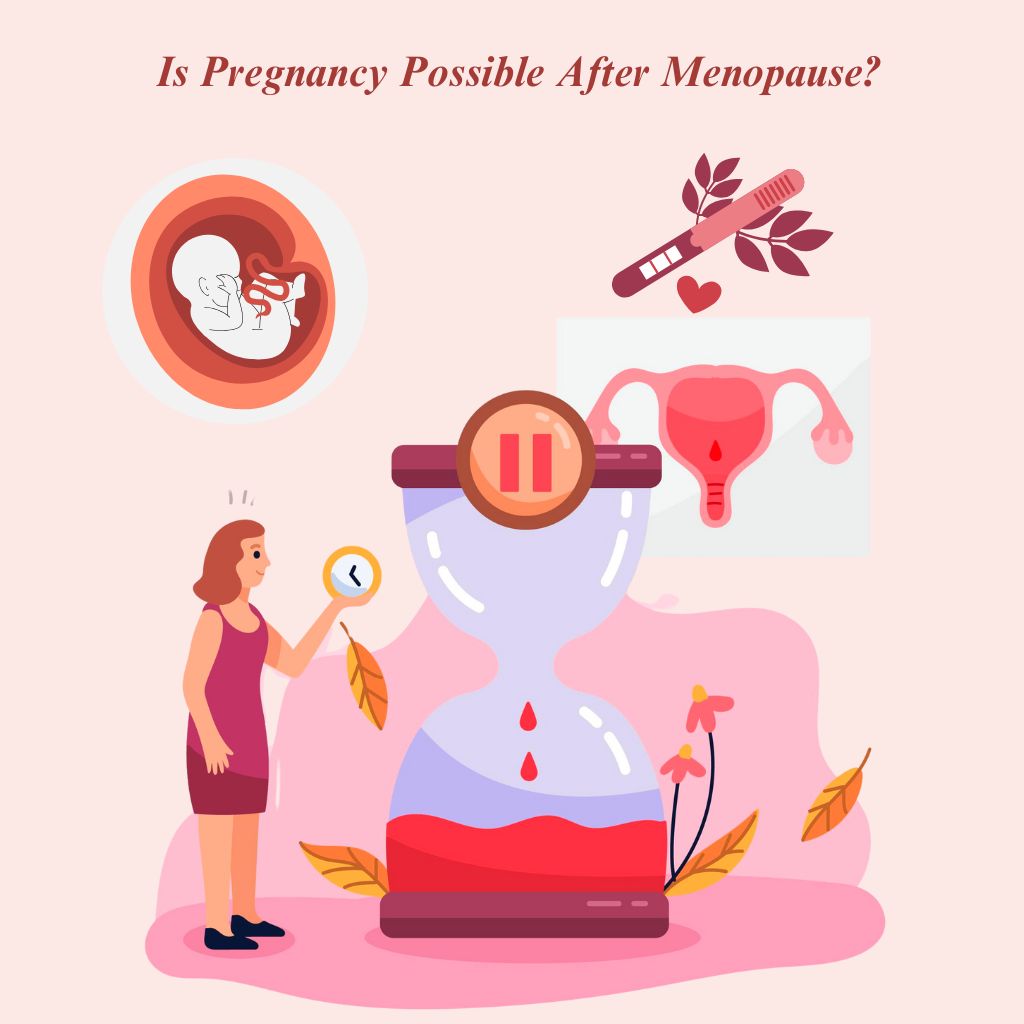
The Science Behind IVF for Post-Menopausal Women
Once menopause is complete, the body no longer produces eggs, and natural pregnancy is no longer possible. However, with advanced reproductive techniques, women can still experience motherhood through IVF post-menopause. This process involves a combination of hormone therapy and donor eggs or frozen embryos, making pregnancy possible even years after menopause.
Can You Get Pregnant During Menopause with No Period?
This is a common concern among women experiencing irregular cycles. During perimenopause, some women still ovulate occasionally, which means pregnancy is technically possible. However, once menopause is complete, ovulation stops permanently, and conception can only occur through medical assistance.
For women seeking pregnancy after menopause, IVF offers a viable solution. Here’s how the process works:
- Hormone Therapy to Prepare the Uterus
Since estrogen and progesterone levels drop after menopause, the uterus is no longer naturally prepared for pregnancy. Hormone therapy is essential to thicken the uterine lining, making it capable of supporting an embryo. This stage lasts a few weeks and is monitored closely by specialists. - Egg Donation or Embryo Freezing
- Women who froze their eggs earlier in life can use them for IVF. The eggs are thawed, fertilized with sperm, and then transferred into the uterus.
- If no frozen eggs are available, donor eggs from a younger woman can be used. These eggs are fertilized and then implanted into the prepared uterus.
- Embryo Transfer and Pregnancy Monitoring
Once the embryo is ready, it is transferred into the uterus. If successful, the pregnancy progresses just like any other, with regular monitoring to manage health risks.
Menopause Pregnancy Success Rates
The success of IVF post-menopause depends on several factors, including age, uterine health, and the quality of the donor egg or embryo. Studies have shown that women using donor eggs can achieve pregnancy rates similar to younger women, as long as the uterus responds well to hormone therapy.
Modern fertility treatments have opened doors for women who once thought pregnancy after menopause was impossible.
IVF After Menopause: How It Works
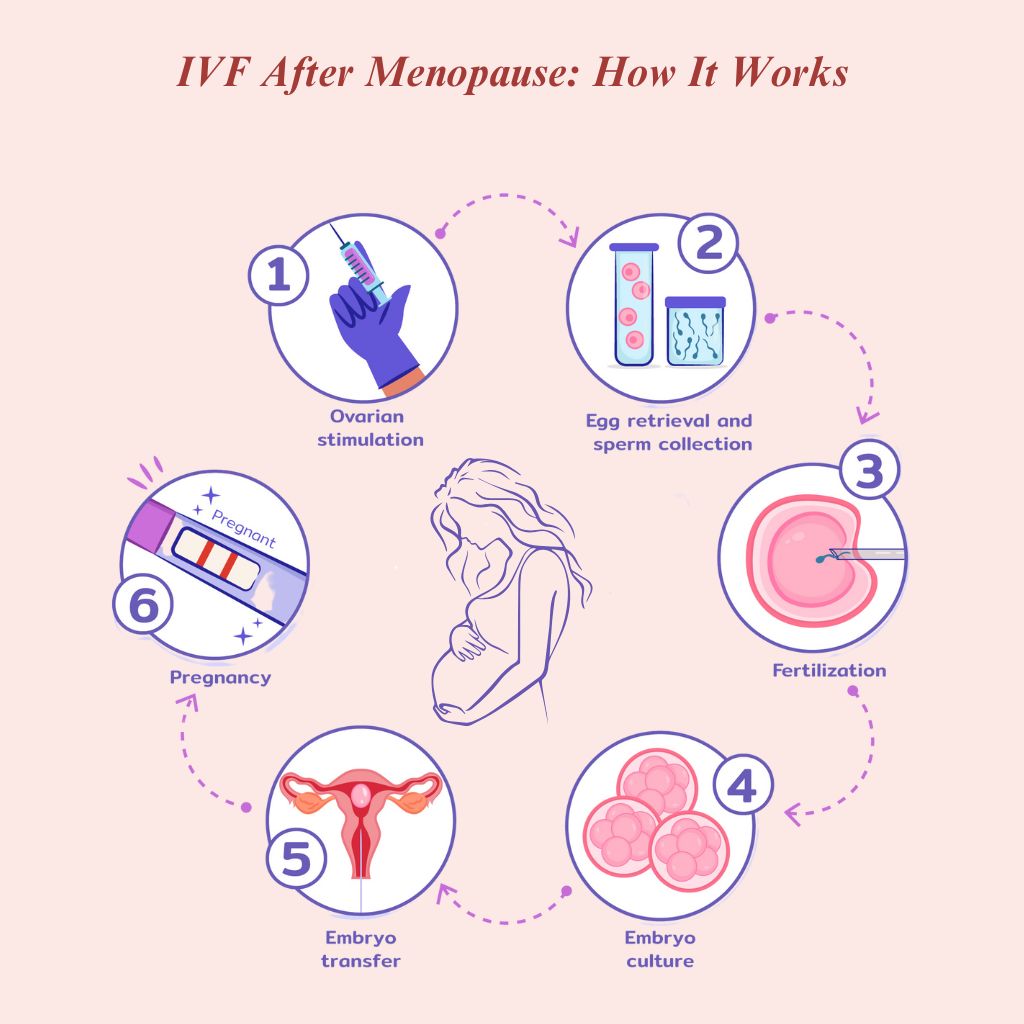
Step-by-Step Breakdown of IVF for Older Women
For women who have reached menopause but still wish to conceive, IVF after menopause offers a medically supported path to pregnancy. Since natural egg production has stopped, assisted reproductive techniques involve hormone therapy, embryo preparation, and implantation. Each stage is carefully monitored to ensure the best chances of success.
1. Hormonal Preparation for the Uterus
After menopause, hormone levels drop, making the uterus unprepared for pregnancy. To create a suitable environment for an embryo, doctors use hormone replacement therapy to thicken the endometrial lining. This process involves:
- Estrogen therapy to stimulate the uterus and prepare it for embryo implantation.
- Progesterone supplementation to support early pregnancy and ensure a stable uterine environment.
This stage is essential because the uterus must be able to sustain a pregnancy despite age-related changes.
2. Egg Donation or Embryo Freezing
Since natural ovulation stops with menopause, most women will need donor eggs or frozen embryos for IVF.
- Egg Donation: A healthy egg from a younger donor is fertilized with sperm to create an embryo.
- Frozen Embryos: Women who preserved their eggs earlier can use them for IVF.
Once the embryo is ready, it is transferred into the uterus. This step is referred to as embryo transfer, and it marks the beginning of the implantation process.
3. Embryo Transfer and Implantation
A few days after fertilization, the embryo is carefully placed into the uterus. This procedure is painless and quick, but its success depends on how well the endometrial lining has been prepared.
After the transfer, doctors monitor hormone levels and implantation success. If the embryo successfully attaches to the uterine wall, the pregnancy begins.
4. Post-Implantation Care and Medical Evaluations
Since perimenopause and pregnancy involve fluctuating hormone levels, close monitoring is required to ensure a safe pregnancy. Doctors track:
- Hormone levels to maintain uterine support.
- Early pregnancy development to prevent complications.
- Overall maternal health, especially for conditions like high blood pressure and diabetes.
Medical advancements have made IVF after menopause possible, but careful preparation and expert supervision are essential. The next section will explore the risks and considerations of pregnancy at an older age, helping women make informed decisions about their reproductive options.
Success Rates of IVF After Menopause
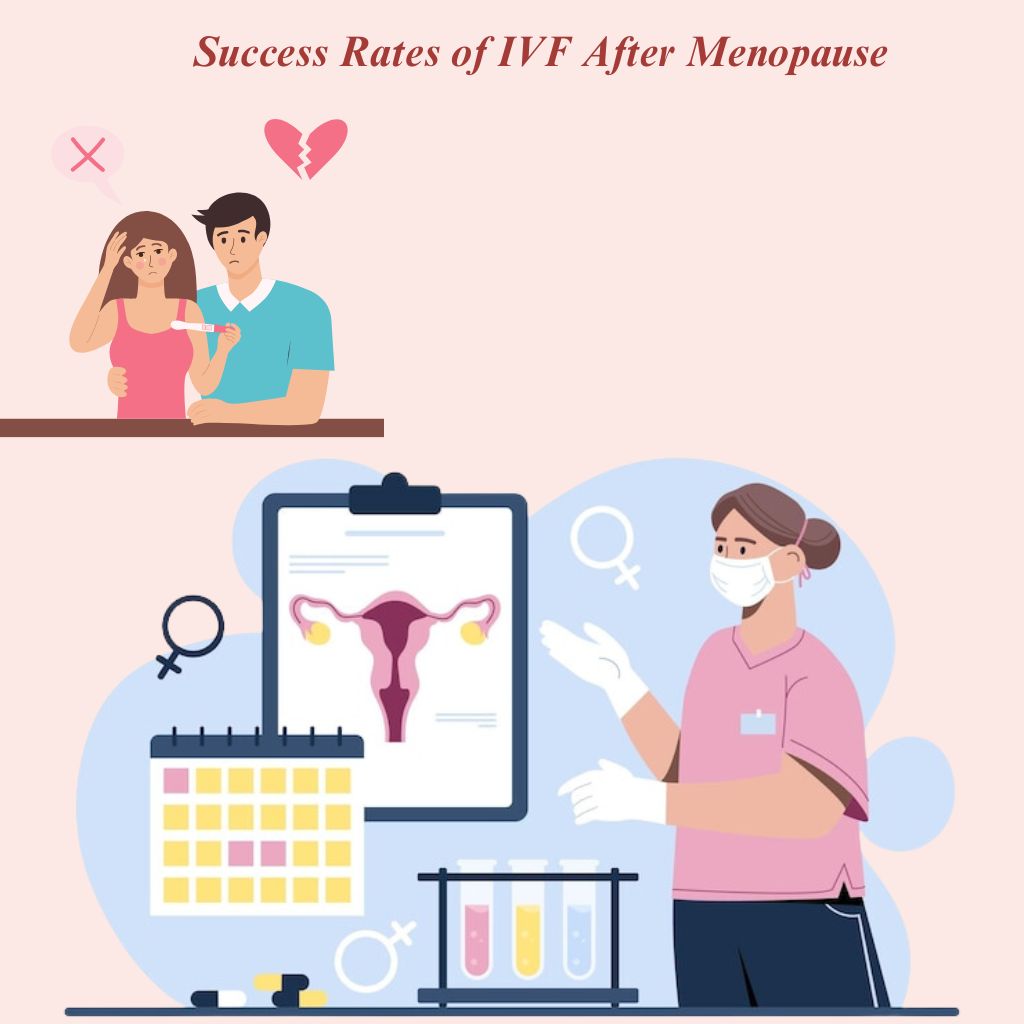
What Are the Chances of a Successful Pregnancy?
Many women wonder whether after menopause pregnancy is possible and how likely it is to succeed. The success of IVF after menopause depends on several factors, including age, uterine health, and whether donor eggs are used. While medical advancements have improved fertility treatments, success rates decline with age due to reduced ovarian function and hormone changes.
Pregnancy After Menopause: What the Data Says
IVF success rates vary significantly based on age and the type of treatment used. Research and clinical data show the following trends:
- Women under 35 have an IVF success rate of 40-50% per cycle.
- Women over 45 have a success rate of less than 5% when using their own eggs. However, this increases to 30-40% with donor eggs.
- Post-menopausal women can achieve pregnancy if the uterus is in good health and responds well to hormone therapy.
Why Are Donor Eggs More Successful?
As women age, their ovarian reserve declines, meaning the quantity and quality of their eggs decrease. This affects fertilization and embryo viability. For women who have already gone through menopause, their own eggs are no longer viable, making donor eggs the best option.
Studies show that pregnancy rates using donor eggs are similar to those of younger women since the eggs come from a healthy, fertile donor. The main concern shifts to uterine health, which can be managed with hormone therapy.
Factors That Affect IVF Success After Menopause
Several factors influence the outcome of IVF post-menopause, including:
- Overall health: Conditions like diabetes, high blood pressure, and heart disease can impact pregnancy.
- Uterine condition: The uterus must be able to support an embryo, which is why hormone replacement therapy is necessary.
- Embryo quality: The success rate is higher when high-quality donor eggs or previously frozen embryos are used.
IVF Success Rate After Menopause: What to Expect
The decision to pursue IVF after menopause should be based on medical evaluation and expert guidance. Women who meet the health criteria and receive proper hormonal support have a good chance of achieving a successful pregnancy. However, each case is unique, and consulting a fertility specialist is the best way to determine individual success probabilities.
Risks and Considerations of IVF Post-Menopause
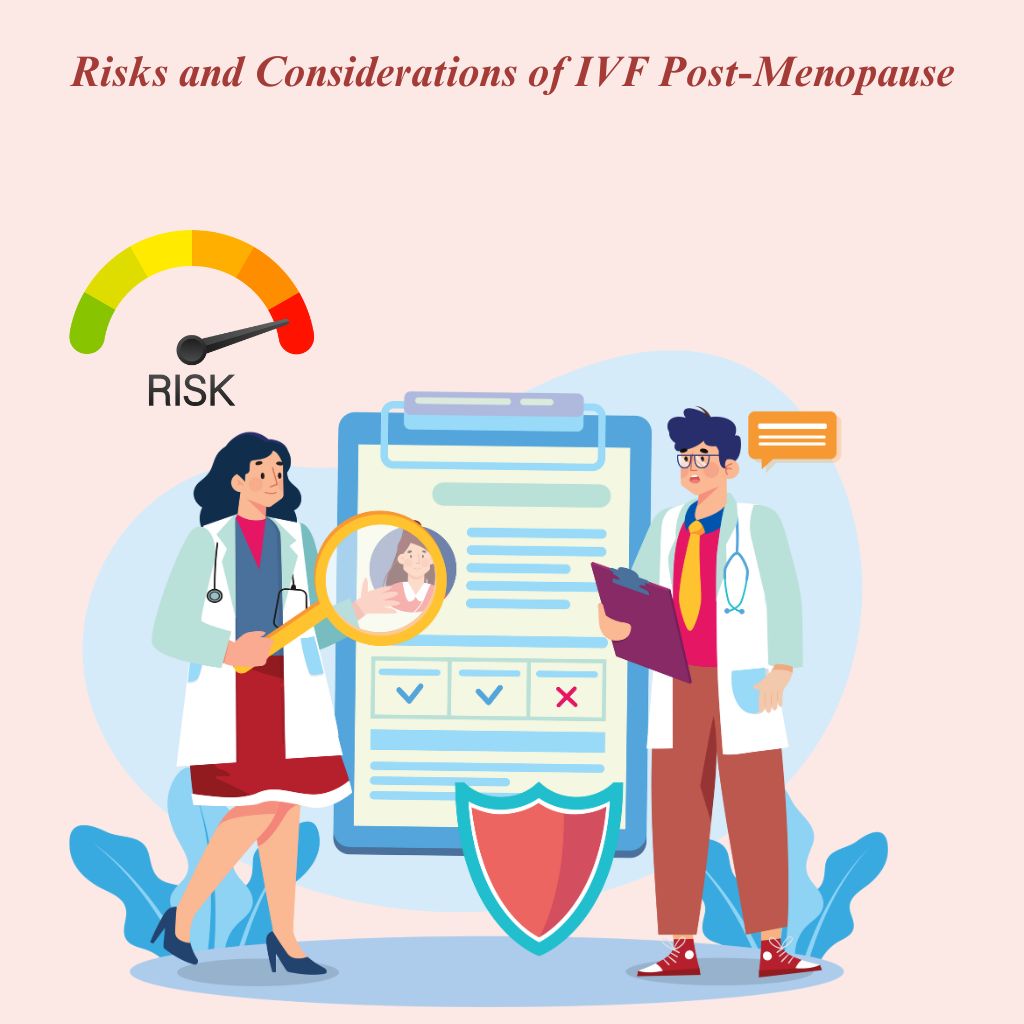
Medical Risks and Health Complications
While IVF after menopause offers a chance for pregnancy, it also comes with medical risks that need careful evaluation. Pregnancy at an older age puts additional strain on the body, increasing the likelihood of complications. Some of the most common gestational risks include:
- High blood pressure (Preeclampsia): A serious condition that can affect both mother and baby, leading to premature delivery.
- Gestational diabetes: Blood sugar levels may rise, increasing the chances of a complicated delivery or the need for a C-section.
- Preterm birth: Babies born early may require neonatal intensive care, as their organs may not be fully developed.
These risks can be managed with regular medical monitoring, but they are important considerations for any woman pursuing pregnancy after menopause.
Hormone Therapy Side Effects
Since the body no longer produces reproductive hormones naturally, women undergoing IVF post-menopause require hormone therapy to prepare the uterus for implantation. While effective, this treatment can cause side effects, such as:
- Mood swings and fatigue: Due to fluctuations in estrogen and progesterone levels.
- Blood clot risks: Some women may develop circulatory issues, increasing the risk of deep vein thrombosis (DVT).
A thorough medical assessment is necessary before starting hormone therapy to ensure safety and reduce potential complications.
Ethical and Social Considerations
The decision to conceive after menopause raises ethical and social questions. Some concerns include:
- Child’s well-being: Critics argue that older parents may have less time to raise their child or may face health challenges that impact parenting.
- Medical responsibility: Fertility specialists must assess whether a woman is physically capable of carrying a pregnancy without significant risks.
Despite these concerns, many women have successfully given birth through IVF after menopause, proving that age alone should not define motherhood.
Legal Restrictions on IVF Age Limits in India
While IVF is widely available, many countries, including India, have age-related restrictions on treatment. In India:
- The upper limit for IVF treatment varies, but most clinics follow guidelines set by the Indian Council of Medical Research (ICMR).
- Women above 50 may face challenges in finding a clinic willing to perform IVF due to health risks and ethical concerns.
Can a Woman Conceive After Menopause?
Naturally, conception is not possible after menopause, as ovulation stops permanently. However, with advanced fertility treatments, women can carry a pregnancy with donor eggs and hormone therapy.
Without Period Pregnancy Is Possible?
Many women are confused about whether pregnancy is still possible after long periods of no menstruation. The answer depends on whether they are in perimenopause or full menopause:
- During perimenopause, ovulation may still occur, so natural pregnancy can happen in rare cases.
- After menopause, natural pregnancy is no longer possible, and IVF is the only option.
While IVF after menopause has given many women the chance to experience motherhood later in life, it requires careful medical assessment and ethical consideration. The next section will discuss alternative options for women considering fertility treatments beyond traditional IVF.
Alternatives to IVF for Post-Menopausal Women
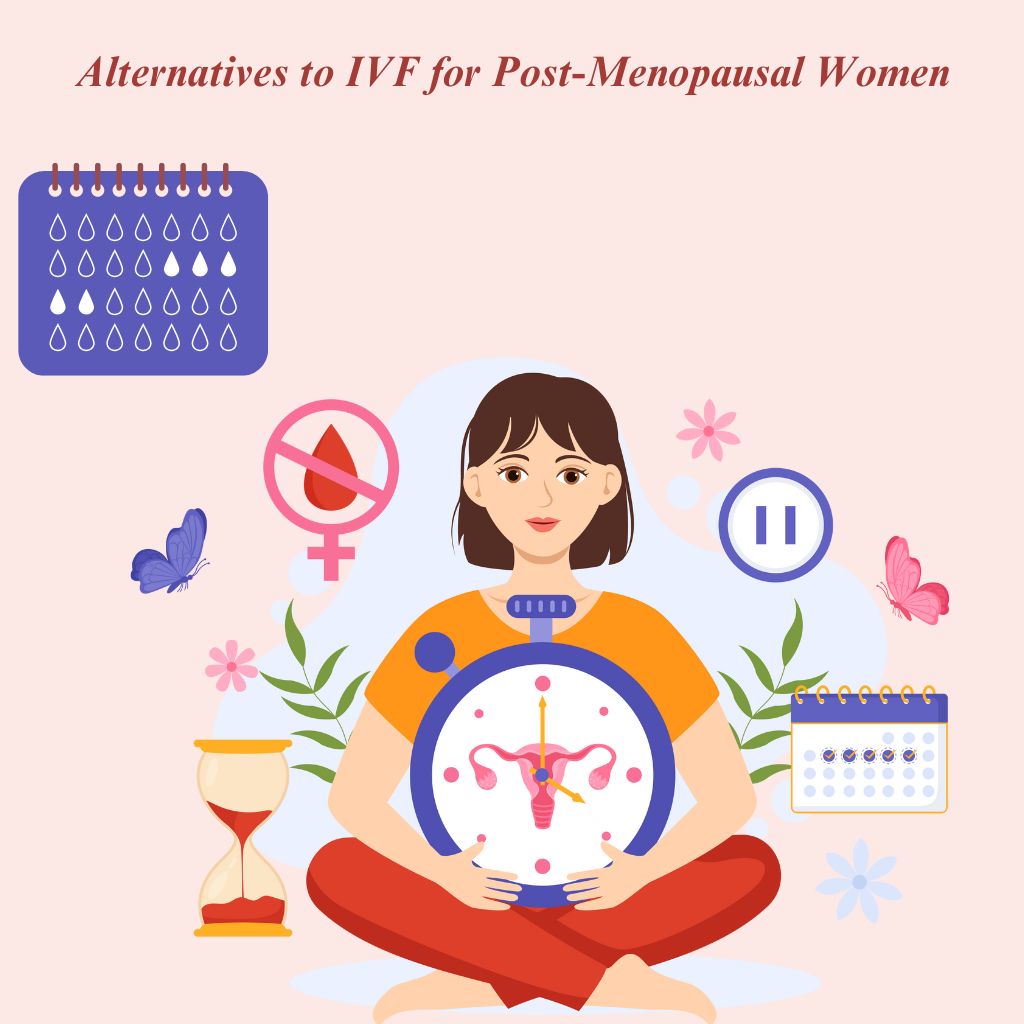
Can IVF Be Done After Menopause?
While IVF post-menopause is a viable option for some women, others may prefer different paths to parenthood. Medical conditions, ethical concerns, or personal choices might lead them to explore alternatives such as surrogacy, adoption, or fertility preservation.
1. Surrogacy: An Alternative to Carrying a Pregnancy
For women who are unable or unwilling to carry a pregnancy after menopause, surrogacy offers a solution. This involves another woman (the surrogate) carrying the baby on behalf of the intended parents.
- The intended mother’s egg (or a donor egg) is fertilized with sperm through IVF and implanted into the surrogate’s uterus.
- Surrogacy laws in India regulate the process, allowing only altruistic surrogacy (where the surrogate is not paid beyond medical expenses).
2. Adoption: A Path to Parenthood Without Pregnancy
For women who have completed menopause and pregnancy is no longer an option, adoption provides a way to build a family without medical procedures. Adoption can be pursued through:
- Government adoption agencies that match parents with children in need of a home.
- Private adoption options for those who prefer to adopt newborns or infants.
Unlike IVF, adoption eliminates medical risks and allows women to become mothers without undergoing fertility treatments.
3. Fertility Preservation: Freezing Eggs for Future Use
Women who are not yet ready for pregnancy but want the option later in life can consider fertility preservation before menopause. This involves egg freezing, which allows a woman’s younger, healthier eggs to be stored and used for future IVF post-menopause.
- Eggs are retrieved, frozen, and stored in a specialized facility.
- When the woman is ready, the eggs can be thawed, fertilized, and implanted into the uterus.
This method allows women to delay motherhood while preserving the possibility of using their own eggs instead of relying on donor eggs later.
4. Lifestyle Changes to Support Fertility
While natural conception is not possible after menopause, some lifestyle choices may help improve overall reproductive health before menopause, such as:
- Maintaining a balanced diet to support hormone levels.
- Managing stress to prevent disruptions in ovulation.
- Avoiding smoking and excessive alcohol, as they accelerate ovarian decline.
Choosing the Right Path
The decision between IVF post-menopause, surrogacy, adoption, or fertility preservation depends on personal health, ethical considerations, and family goals. Consulting with fertility specialists and legal advisors can help women determine the best approach based on their unique circumstances.
How to Choose the Right IVF Clinic & Doctor
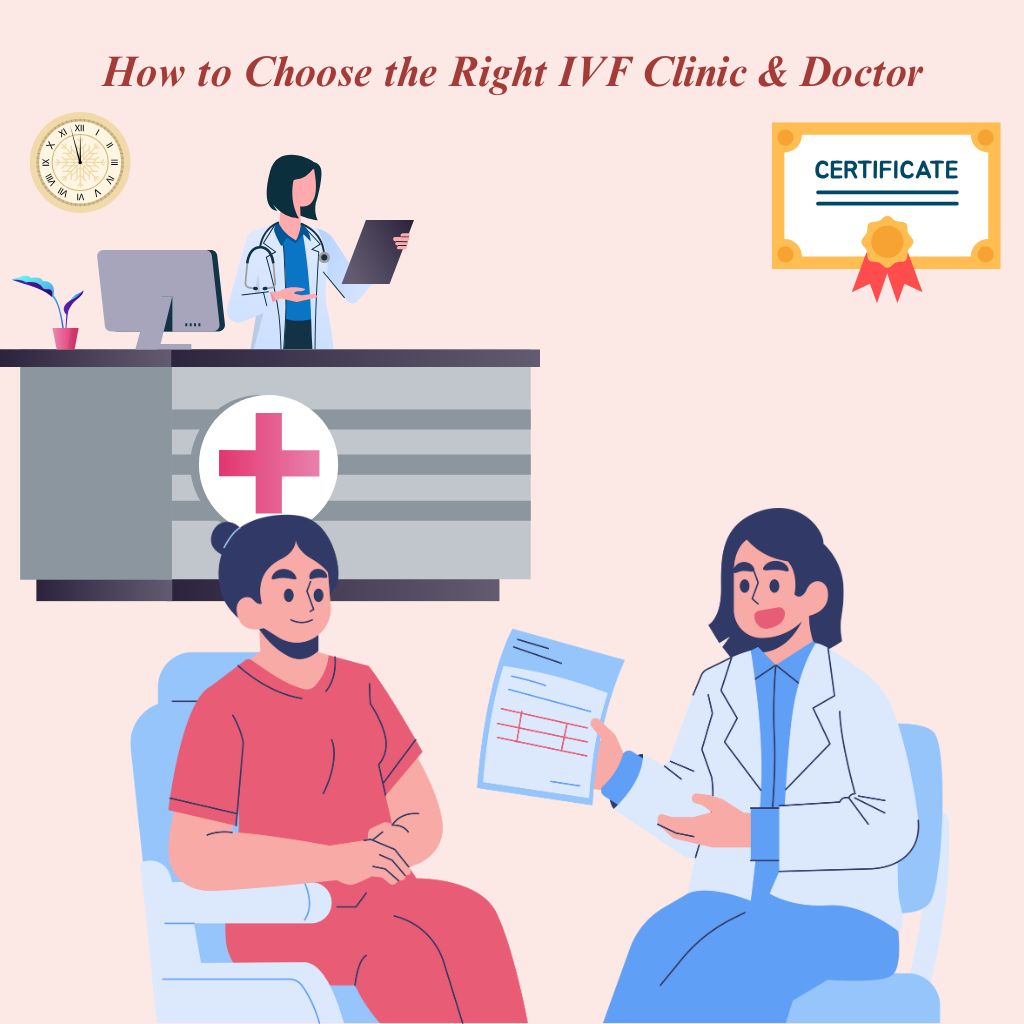
Finding the Best Medical Support for IVF After Menopause
For women considering IVF after menopause, selecting the right fertility clinic and doctor is one of the most important decisions. A successful treatment depends on medical expertise, advanced technology, and personalized care.
1. What to Look for in an IVF Clinic
Choosing a clinic involves more than just checking success rates. The best women care clinic or maternity hospital should offer:
- Advanced fertility treatments: The clinic should specialize in treating women of all ages, including those undergoing IVF post-menopause.
- Comprehensive medical evaluation: A thorough assessment of uterine health and hormone levels is necessary before starting treatment.
- Personalized hormone therapy: Since hormone levels decline after menopause, the clinic should provide customized hormone replacement therapy to prepare the uterus.
2. Importance of an Experienced Fertility Specialist
The expertise of the doctor is just as essential as the clinic itself. A highly qualified fertility specialist, such as Dr. Shilpa, can help determine:
- The best IVF protocol based on a woman’s age and medical history.
- The most suitable embryo transfer strategy for post-menopausal patients.
- Risk management during pregnancy, ensuring a safe and healthy outcome.
Consulting with the best gynaecologist in Mumbai or a fertility expert with proven experience in menopause-related IVF cases can make a significant difference in success rates.
3. Cost Breakdown and Financing Options in India
IVF treatments can be expensive, but many clinics offer financing options to make it more accessible. The cost of IVF after menopause in India depends on factors like:
- Egg donation: Women using donor eggs may pay additional fees for the selection and medical screening of the donor.
- Hormone therapy: Since post-menopausal women need hormone replacement before embryo transfer, the cost of medications can vary.
- Clinic reputation and technology: Established fertility centers with high success rates may charge higher fees.
Some best fertility clinics for menopause IVF provide flexible payment plans or insurance support for fertility treatments. It’s essential to research costs, compare options, and discuss financing before starting the process.
Making the Right Decision
Choosing the right fertility clinic and doctor requires careful consideration. Women should look for proven success in post-menopausal IVF cases, personalized treatment plans, and financial transparency.
Frequently Asked Questions
Q1: Can a woman naturally conceive after menopause?
Ans: No, natural conception is not possible after menopause because ovulation stops permanently. However, with IVF post-menopause, pregnancy can still be achieved using donor eggs or previously frozen embryos.
Q2: How does IVF work for post-menopausal women?
Ans: Since a woman’s ovaries no longer produce eggs after menopause, IVF is done using donor eggs or frozen embryos. Hormone therapy is used to prepare the uterus, and once the embryo is implanted, the pregnancy progresses like any other.
Q3: What are the risks of pregnancy after menopause?
Ans: Pregnancy at an older age carries certain risks, including high blood pressure, gestational diabetes, and premature birth. Women also require close medical monitoring to ensure the pregnancy remains safe for both mother and baby.
Q4: Is donor egg IVF the only option after menopause?
Ans: Yes, for most women, donor eggs are the best option since natural ovulation stops permanently after menopause. Women who froze their eggs before menopause may also use them for IVF.
Q5: What is the success rate of IVF for women over 50?
Ans: The success rate of IVF after menopause depends on various factors. Studies show that:
- Women over 45 have a success rate of less than 5% with their own eggs, but 30-40% with donor eggs.
- Post-menopausal women can achieve pregnancy if the uterus responds well to hormone therapy.
Q6: Does menopause affect the quality of the uterus for pregnancy?
Ans: Menopause does not necessarily prevent the uterus from carrying a pregnancy, but hormonal support is required to thicken the uterine lining for implantation. This is done through hormone replacement therapy before IVF.
Q7: Are there legal age restrictions for IVF in India?
Ans: Yes, in India, there are age restrictions for IVF. Most clinics follow guidelines from the Indian Council of Medical Research (ICMR), which recommend an upper age limit of 50-55 years for women undergoing IVF. Some clinics may have their own restrictions based on health assessments.
Q8: What is the cost of IVF after menopause in India?
Ans: The cost of IVF post-menopause varies depending on factors such as:
- Use of donor eggs or frozen embryos
- Hormone therapy requirements
- Clinic reputation and success rates
On average, IVF in India can cost anywhere between ₹1.5 to ₹3.5 lakh per cycle, with additional expenses for medications and embryo storage.
Q9: How does hormone therapy help in IVF after menopause?
Ans: Since the body no longer produces reproductive hormones naturally, hormone therapy is used to:
- Thicken the uterine lining for successful implantation.
- Support early pregnancy by maintaining proper hormone levels.
- Reduce the risk of miscarriage in post-menopausal women.
Q10: Are there any lifestyle changes that can improve IVF success?
Ans: Yes, certain lifestyle choices can support IVF success, including:
- Maintaining a healthy diet to optimize hormone balance.
- Managing stress and sleep patterns for better hormonal stability.
- Avoiding smoking and excessive alcohol, which can affect fertility.
Conclusion
IVF after menopause is a viable option for women who wish to conceive later in life. While there are medical, ethical, and financial considerations, advancements in reproductive medicine have made pregnancy after menopause possible. Consulting with an experienced fertility specialist like Dr. Shilpa and choosing the best maternity hospital or women care clinic can help ensure a safe and successful pregnancy journey.


